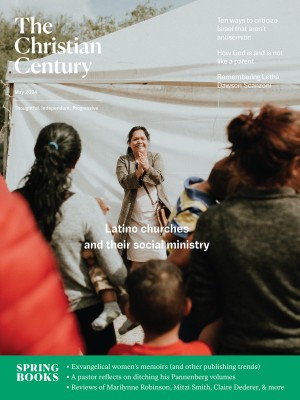May 19, Pentecost (Acts 2:1–21)
Acts points us to a better communion, one that preserves and celebrates diversity.
Does the same holy spirit that confuses language make true communication possible? Many commentators have read the story of Pentecost as a reversal of the confusion of languages characteristic of the Tower of Babel: just as God confuses the language of overambitious humans in Genesis, so the coming of God’s Holy Spirit at the birth of the church allows for linguistic differences to be overcome. And just as it is problematic to read the Tower of Babel account as a theological lament against human diversity, so too it would be dangerous to see the Spirit’s establishment of the church via communication (with its same roots as the words communion and exchange) as somehow overcoming or flattening diversity. What is a better alternative? Can the text point the way?
Progressive Christians have long sought to onboard the best insights from broader critical theories and social justice movements when it comes to language, particularly intersectional language. We try to remember that we cannot helpfully talk about income disparities in the United States without being attentive to race, that we cannot for long discuss class without discussing gender, and so on. And thus preachers, worship leaders, teachers, and others who speak language about God and humanity into the public sphere have learned to think along multiple dimensions when it comes to what we represent with our language and how—dimensions such as race, class, ability, sexuality, and so on. This is theologically necessary work.
Read our latest issue or browse back issues.
But like all theologically necessary work, it brings with it temptations and dangers. The danger is that we who seek to speak about God and humanity while doing justice to differing degrees of complexity might soon develop a Babel-like linguistic pride, a pretension that any one person or group can attain the perfect language: intersectional, all-encompassing, doing equal justice to all difference and complexity. Such linguistically idolatrous pretension would be little better than the very theological languages that intersectional language has sought to replace: the singular (White, male, European, etc.) voice, the “universal” language of the theological colonizer.
In other words, if the idolatrous pretension of much Christian philosophy has been to universalize a singular voice and social location as speaking for humanity, then those who wish to overcome this pretense and do justice to overlapping perspectives must avoid the temptation to return to univocity, this time in the form of “perfected” intersectional language that remains the possession of one person or group. Such a temptation not only creates linguistic idols, it also hinders genuine solidarity: it cannot but foster division across all the gifts that are not represented in such “master discourse,” all the ways such pretentious language inevitably fails.
But Acts points us to a better way. Communication, communion, the exchange of gifts—all this does indeed happen in this text by the Spirit’s power. However, it is a communion that preserves and indeed celebrates diversity. The story of Acts, like the story of the early church itself, is not one of flattening diversity in the name of a singular discourse. Rather, the very vitality of the movement—as reflected in the exuberant details of the narrative itself—comes from its encompassing “Parthians, Medes, Elamites, and residents of Mesopotamia, Judea and Cappadocia, Pontus and Asia, Phrygia and Pamphylia, Egypt and the parts of Libya belonging to Cyrene, and visitors from Rome, both Jews and proselytes, Cretans and Arabs.” The text positively revels in preserved diversity, even as the church is formed in the midst of new levels of comprehension of the foreigner and stranger.
Philosopher Alain Badiou, in Saint Paul: The Foundation of Universalism, marvels at this particular genius of the early church. Badiou, who identifies as a nonbeliever, sees in the early Christian movement a paradigm for what it might mean for various causes seeking justice to overcome their fragmentation along identitarian lines and to enact true communication, true gift exchange across diversity, and genuine solidarity toward justice. The very same movement that unites believers such that “in Christ, there is neither Jew nor Greek” (Gal. 3:28) is the movement that preserves diverse identities even as it forms new pathways for solidarity among them.
Few of us need to be reminded that the actual historical church has regularly failed to live up to this lofty ideal, and there are dangers in idealizing even the images of the church put forward in scripture. However, even as Acts soberly reminds us of our tendency to long for idolatrous self-sufficiency, the pretense of comprehensive speech that we can own and yield, it also evokes a call to the Spirit-filled breakdown of this pretense toward openness to true communion. In such communion lies the path to solidarity, to work alongside the Spirit in healing the world in which idols still wreak their damage.






